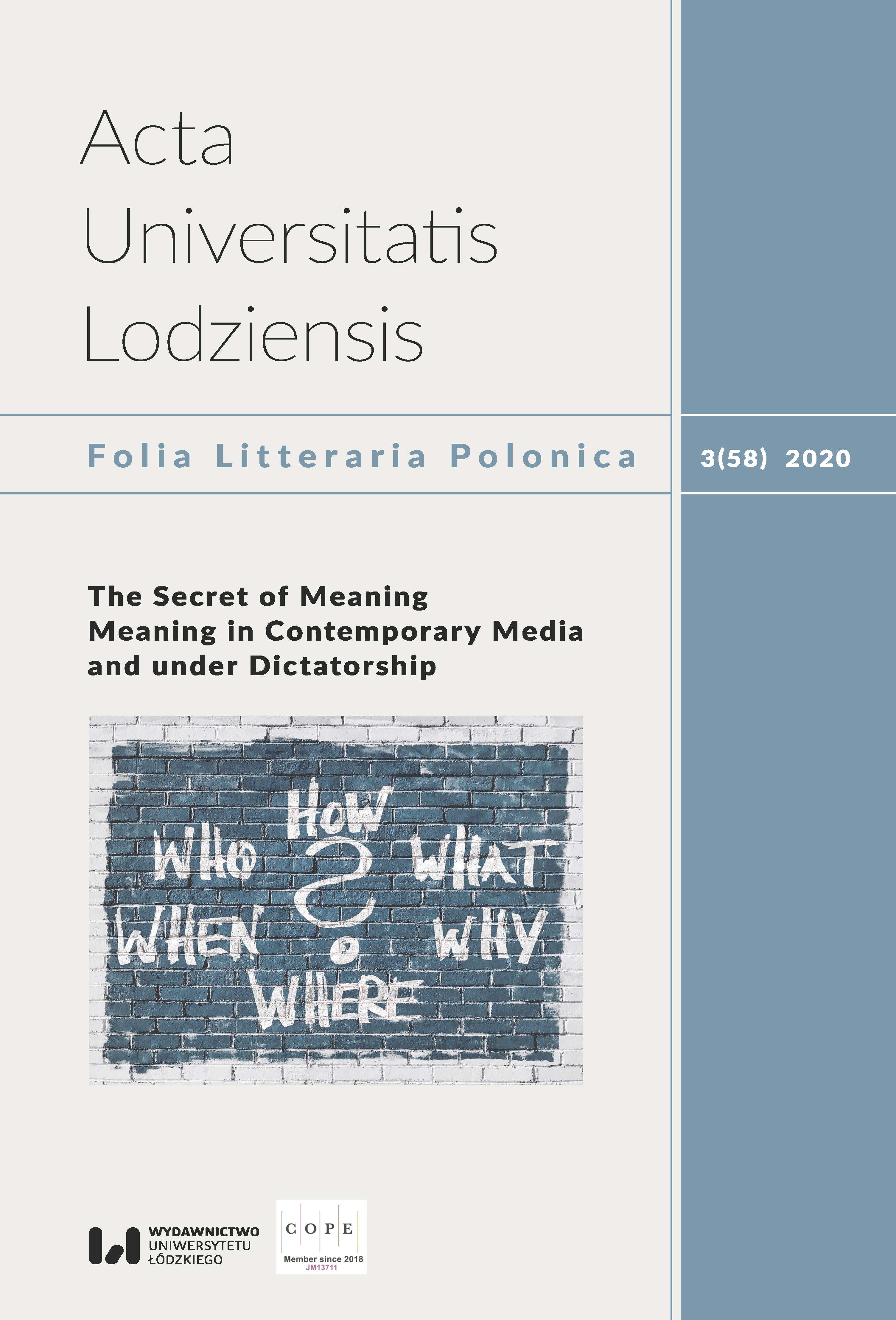The City of Man and the critique of fascism: The perspective of Hermann Broch
DOI:
https://doi.org/10.18778/1505-9057.58.20Keywords:
The City of Man, Hermann Broch, Paul Michael Lützeler, Ludwig von Mises, fascismAbstract
The City of Man initiative, with a conscious reference to Saint Augustine’s De civitate Dei, wanted to build a system after the First World War that would ensure free and unfettered human development. This initiative was undertaken by emigrants from Europe and eminent American intellectuals: they all hoped that a realized democracy in the classical Greek sense of the word would not only give us peace, but also open a perspective that, among other things, would eliminate socialism in its fascist and Bolshevik variants.
Why do I open, however, an article devoted to this somewhat forgotten initiative with remarks on the subject of Hermann Broch, who, though he played an important role in the work of this group, was simply “one of many” (exactly one of the seventeen members of the group)? This is due to the fact that his voice was weighty. I also follow Paul Michael Lützeler’s suggestions; it must be remembered that the issues raised in the manifesto of the aforementioned group were taken up by the writer and philosopher, from the beginning of his activity, i.e. from his debut in 1931. It is worth looking at how the artist solved the same problems, which he then “tried” to describe and analyze as a philosopher and theoretician of economics.
Downloads
References
Arendt Hannah, “Einleitung”, [in:] H. Broch, Dichten und Erkennen. Essays, Band I, Rhein Verlag, Zürich 1955 (Gesammelte Werke, Vol. 6, pp. 5–42).
Google Scholar
Broch Hermann, “Hofmannsthal i jego czasy. Studium”, [in:] Hermann Broch, Rozgrzeszenie. Z powietrza wzięte. Dramaty, translation and introduction by M. Ganczar, Wydawnictwo ADiT, Warsaw 2010, pp. 185–191 (transl. R. Turczyn).
Google Scholar
Broch Hermann, Kilka uwag o kiczu i inne eseje, translation in collaboration, Czytelnik, Warszawa 1998 (selection from vol. 9.1–2, and 10.1 Kommentierte Werkausgabe).
Google Scholar
Broch Hermann, Rozgrzeszenie. Z powietrza wzięte. Dramaty, translation and introduction by M. Ganczar, Wydawnictwo ADiT, Warsaw 2010.
Google Scholar
Durzak Manfred, Hermann Broch, Rowohlt Verlag, Frankfurt am Main 1966.
Google Scholar
DOI: https://doi.org/10.1007/978-3-476-99408-0
Eicher Thomas, Lützeler Paul M., Steinecke Hartmut, Hermann Broch. Politik, Menschenrechte- und Literatur, Athena Verlag, Oberhausen 2005.
Google Scholar
Foss Sonja K., Rhetorical Criticism: Exploration and Practice, Waveland Press Inc., Long Grove, Ill. 2004.
Google Scholar
Hoppe Hans-Hermann, Democracy. The God that Failed. The Economics and Politics of Monarchy, Democracy, and Natural Order, transl. W. Falkowski, J. Jabłecki, Fijorr Publ., Warsaw 2005.
Google Scholar
https://mfiles.pl/pl/index.php/New_Deal [accessed on: 17.02.2017].
Google Scholar
Kwiecińska Grażyna, Hermann Brochs Engagement für die Demokratie, Literatur und Politik, Ekochem – Agencja Poligraficzno-Wydawnicza, Warszawa 1999.
Google Scholar
Lichański Jakub Z., Hermann Broch, Wydawnictwo Naukowe Semper, Warsaw 1994.
Google Scholar
Lützeler Paul M., “Donkiszotożuaneria. Hermann Broch o sobie samym”, [in:] Paul M. Lützeler, Autobiografia duchowa, transl. S. Błaut, Czytelnik, Warsaw 2005.
Google Scholar
Lützeler Paul M., Nur eine Weltdemokratie kann uns retten, http://www.tagesspiegel.de/kultur/nur-eine-weltdemokratie-kann-uns-retten/4453704.html [accessed on: 17.02.2017].
Google Scholar
Mises Ludwig von, Ludzkie działanie. Traktat o ekonomii, transl. W. Falkowski, Instytut von Misesa, Warsaw 2007.
Google Scholar
The City of Man. A Declaration on World Democracy, ed. G.A. Borgese, ed. 4, New York, The Viking Press 1941.
Google Scholar
Wallace Donald L., The Death of Civilization. Ethics and Politics in the Work of Hermann Broch, University of California, San Diego 2006.
Google Scholar
Welan Manfried, Das Menschenrecht Hermann Brochs, WPR, Wien 2004 (Disskusionpapier 2004, No. 102-R-04).
Google Scholar
Downloads
Published
How to Cite
Issue
Section
License

This work is licensed under a Creative Commons Attribution-NonCommercial-NoDerivatives 4.0 International License.











